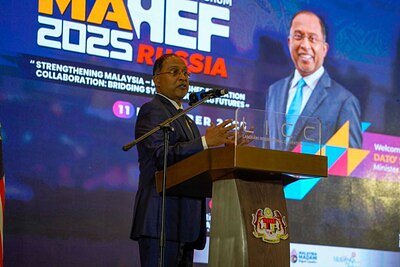
Malaysia & Russia Deepen Education Ties, Eye Growth in Africa & Central Asia
A surge in collaboration promises expanded student exchanges and research opportunities, as Malaysia diversifies its international education strategy beyond traditional markets.
Malaysia & Russia Forge Stronger Education Links, Expand Global Reach
Kuala Lumpur, Malaysia – A growing partnership between Malaysia and Russia is set to reshape the landscape of higher education in both countries, with a focus on expanding opportunities for students and researchers. Recent high-level diplomatic engagements and a surge in bilateral trade have paved the way for increased collaboration, while Malaysia simultaneously looks to diversify its international student recruitment beyond East Asia, with a growing focus on Africa and Central Asia.
This week’s Malaysia-Russia Higher Education Forum, a key component of the broader strategic partnership between the two nations, has resulted in numerous agreements focused on academic exchange, joint research initiatives, and the establishment of new dual-degree programs. The increased cooperation comes amidst a growing trend of Malaysia pursuing a “strategic multi-alignment” foreign policy, seeking to balance relationships with major global powers and reduce reliance on any single nation.
“The relationship with Russia is an important part of our broader strategy to diversify our international partnerships,” explained a source within the Malaysian Ministry of Higher Education. “We see significant opportunities for collaboration in areas such as energy, technology, and, of course, education.”
Deepening Ties Beyond the Classroom
The recent strengthening of Malaysia-Russia relations isn’t limited to academic circles. Trade between the two countries has seen a substantial increase, growing by over 60% in the first quarter of 2025 compared to the previous year. This economic boost has created a favorable environment for educational collaboration, with Malaysian universities actively seeking partnerships with Russian institutions.
Several agreements were signed during the Forum, including a collaboration between Universiti Malaysia Sabah and Russia’s Almetyevsk State Technological University to enhance research and technical training in the oil and gas sector. Limkokwing University of Creative Technology has also partnered with Synergy University to promote innovative approaches to education and offer new academic opportunities. Furthermore, Universiti Kuala Lumpur is aiming to become a regional hub for Russian language studies, building on its existing 19-year collaboration with The Pushkin State Russian Language Institute.
“This isn’t just about student exchanges,” said an academic involved in the partnership negotiations. “We’re looking at joint research projects, the development of new curriculum, and the sharing of expertise in areas where both countries have strengths.”
Expanding Beyond Traditional Markets
While Malaysia has traditionally relied heavily on attracting students from East Asia, South Asia, and the Middle East, a strategic shift is underway to diversify its international student base. Education Malaysia Global Services (EMGS), the agency responsible for promoting Malaysia as a global education hub, is actively exploring new markets in Africa and Central Asia.
“We recognize the need to diversify our recruitment efforts,” stated a source at EMGS. “While East Asia remains an important market, we see tremendous potential in Africa and Central Asia, where demand for quality higher education is growing rapidly.”
Applications from Africa have increased by 23% in recent years, while applications from Central Asia have jumped by 42%. EMGS is planning to host the next Malaysia-Russia Higher Education Forum in Africa, signaling a clear commitment to expanding its reach on the continent.
The growing interest from African and Central Asian students stems from several factors, including Malaysia’s affordable tuition fees, high-quality universities, multicultural environment, and political stability. The availability of scholarships and the fact that many programs are taught in English also make Malaysia an attractive destination for international students.
Navigating Geopolitical Complexities
The strengthening of ties between Malaysia and Russia is occurring against a backdrop of geopolitical complexities. Russia faces international condemnation for its actions in Ukraine, and Malaysia must navigate these sensitive issues while pursuing its strategic interests.
“We are aware of the challenges,” acknowledged a government official. “But we believe that education can be a bridge between cultures and a force for peace. We are committed to maintaining open communication and fostering collaboration in areas where we have shared interests.”
The Malaysian government has adopted a nuanced approach, seeking to balance its relationships with all major global powers. This “strategic multi-alignment” policy allows Malaysia to pursue its own interests while avoiding being drawn into geopolitical conflicts.
The Future of Malaysia-Russia Education Collaboration
The recent agreements and initiatives signal a promising future for Malaysia-Russia education collaboration. Several key areas are poised for growth:
- Joint Research: Increased funding and collaboration in areas such as energy, technology, and sustainable development.
- Student and Faculty Exchanges: Expanded programs to promote cross-cultural understanding and academic collaboration.
- Dual-Degree Programs: The development of new programs that combine the strengths of Malaysian and Russian universities.
- Language Training: Enhanced programs to promote the study of Russian and Malay languages.
- Technological Innovation: Collaboration in areas such as digital learning and educational technology.
“We are confident that this partnership will benefit both our countries,” said a spokesperson for the Malaysian Ministry of Higher Education. “By working together, we can create a brighter future for our students and researchers.”
As Malaysia continues to diversify its international education strategy and expand its reach into new markets, the partnership with Russia is expected to play an increasingly important role in shaping the future of higher education in the region. The commitment to collaboration, innovation, and cross-cultural understanding promises to create new opportunities for students and researchers in both countries, and contribute to a more interconnected and collaborative world.
